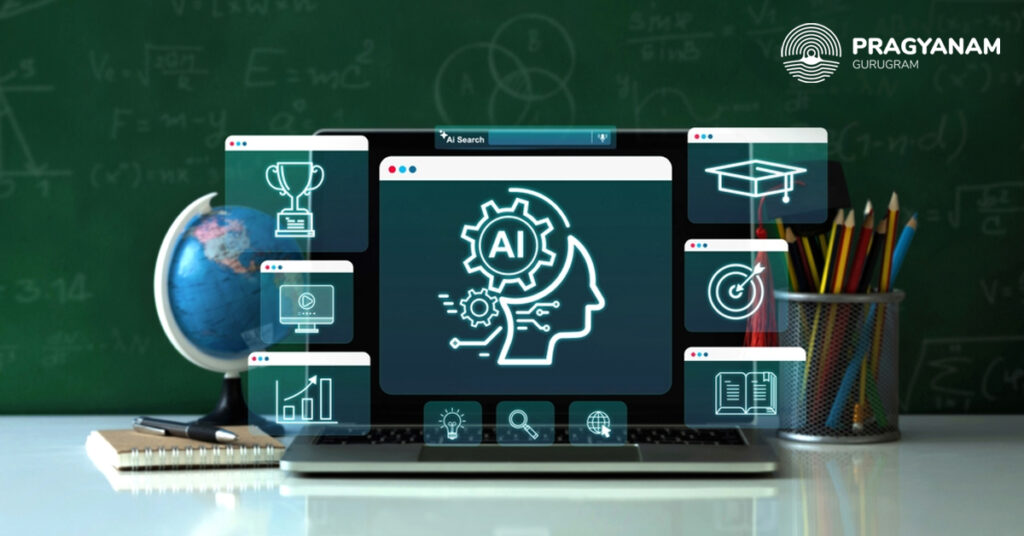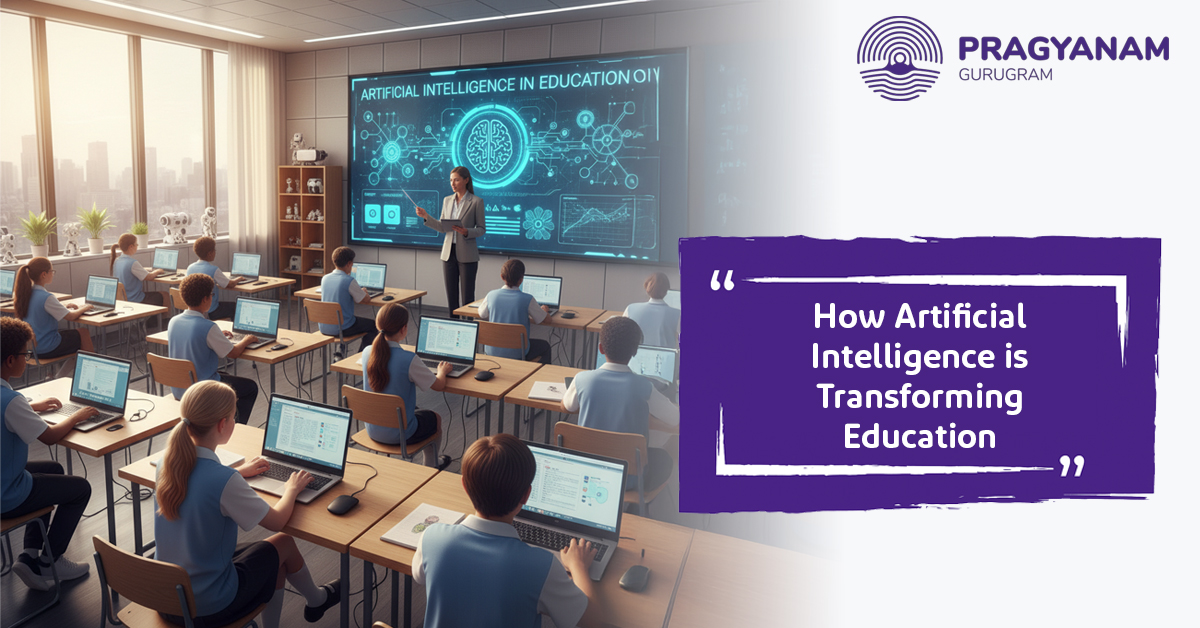Education is changing faster than ever before. With technology becoming a part of everyday life, one of the most exciting developments in recent years is the integration of Artificial Intelligence (AI) in schools. AI is no longer a concept of the future—it is transforming how children learn, how teachers teach, and how schools manage education.
At Pragyanam School, we believe in combining modern technology with life skills-based learning to prepare students not only for exams but for life itself. AI plays a significant role in helping us achieve this vision.
Table of Contents
What is Artificial Intelligence in Education?
Artificial Intelligence is a branch of computer science that enables machines to think, learn, and make decisions like humans. In education, AI is used to personalize learning, assist teachers, and improve the overall learning experience. It can analyze large amounts of data, track student performance, and provide solutions tailored to each child’s unique needs.
In simple terms, AI acts as a smart assistant that helps both students and teachers focus on learning and growth instead of repetitive tasks.

How AI is Changing the Way Students Learn
1. Personalized Learning for Every Child
Every child learns differently. Some grasp concepts quickly, while others need more practice. AI-powered platforms can adapt lessons to each child’s pace and learning style.
At Pragyanam School, we use AI tools that:
- Identify topics a student finds challenging.
- Suggest exercises, videos, or quizzes based on their strengths and weaknesses.
- Allow faster learners to explore advanced concepts without waiting for the entire class.
This ensures that every child feels confident and motivated to learn.
2. Interactive and Smart Learning Materials
AI helps create interactive lessons that go beyond textbooks. Digital tutors, simulations, and gamified lessons make learning fun and engaging.
Examples include:
- AI tutors that guide students through math problems step-by-step.
- Language apps that instantly correct pronunciation and grammar.
- Science simulations that let students experiment virtually.
At Pragyanam School, we combine AI with our life skills-based approach, ensuring students not only understand concepts but also learn how to apply them in real life.
3. Real-Time Feedback for Improvement
AI provides instant feedback to students, helping them correct mistakes and reinforce learning immediately. Unlike traditional methods where feedback may take days, AI ensures continuous improvement.
Teachers at Pragyanam School use AI insights to:
- Understand each student’s learning patterns.
- Provide additional support where needed.
- Track progress over time, helping students achieve long-term success.
4. Virtual Classrooms and AI Assistants
AI-powered virtual classrooms make learning flexible and accessible. AI assistants can:
- Schedule lessons and reminders.
- Answer common questions.
- Monitor student engagement and participation.
During the pandemic, AI tools helped schools like Pragyanam continue learning seamlessly, ensuring students stayed connected, motivated, and on track.
5. Gamification and Experiential Learning
AI enables game-based learning, where students learn concepts through interactive games and challenges.
Benefits include:
- Making learning fun and engaging.
- Encouraging healthy competition and collaboration.
- Reinforcing lessons in a creative way.
At Pragyanam School, we combine AI gamification with life skills activities, helping students develop critical thinking, teamwork, and decision-making abilities.
How AI Supports Teachers and Schools
1. Automating Repetitive Tasks
Teachers often spend hours grading papers, tracking attendance, and scheduling lessons. AI can automate these tasks, allowing teachers to focus on teaching and mentoring students.
2. Data-Driven Insights
AI analyzes student performance data to provide actionable insights. Teachers can identify trends, predict exam performance, and tailor lessons accordingly.
3. Resource Management
AI helps schools manage classrooms, labs, and educational resources efficiently, ensuring every student gets the best learning environment.
Benefits of AI in Education
- Personalized Learning – Students learn at their own pace.
- Immediate Feedback – Helps students correct mistakes instantly.
- Better Teaching Support – Teachers get insights to improve lessons.
- Enhanced Engagement – Lessons are interactive and fun.
- Accessibility for All – AI tools help children with disabilities through adaptive learning, speech-to-text, and more.
Challenges of AI in Education
While AI brings many benefits, there are also challenges:
- Cost – Advanced AI tools can be expensive for schools.
- Data Privacy – Handling student data safely is critical.
- Dependence on Technology – Over-reliance may reduce face-to-face interaction.
- Teacher Training – Teachers need proper training to use AI effectively.
- Equity – Not all students may have equal access to AI tools, especially in remote areas.
Pragyanam School addresses these challenges by ensuring teachers are trained, data is protected, and technology supplements human interaction instead of replacing it.
The Future of AI in Education
AI in education is just the beginning. In the future:
- Adaptive learning systems will become smarter, adjusting lessons automatically based on performance.
- AI-driven assessments will go beyond tests, evaluating creativity, problem-solving, and emotional intelligence.
- Global collaboration – AI will connect students worldwide for joint projects and cultural learning.
- Lifelong learning – AI will make education accessible for all ages, supporting continuous growth.
At Pragyanam School, we see AI as a partner in lifelong learning, helping students build knowledge, confidence, and skills they will need in the real world.





